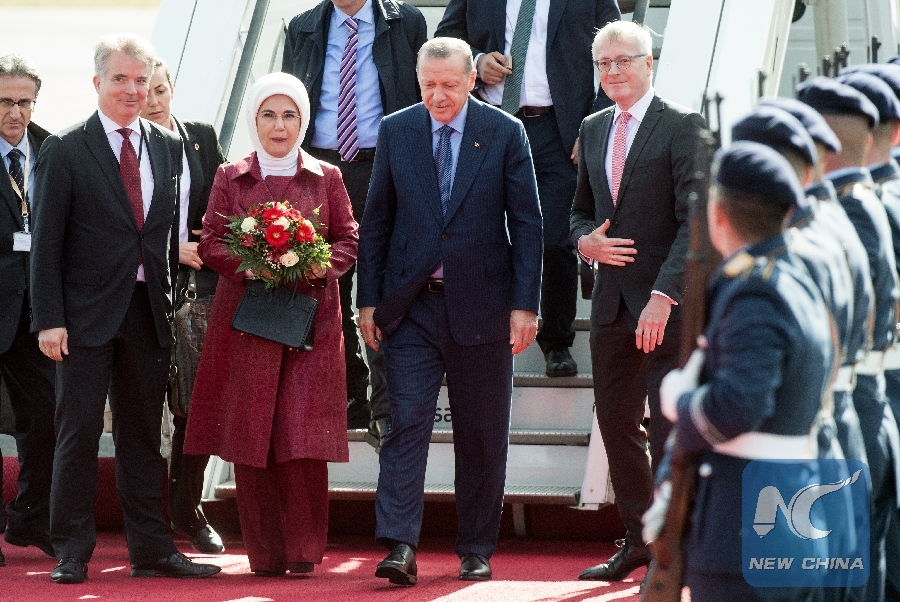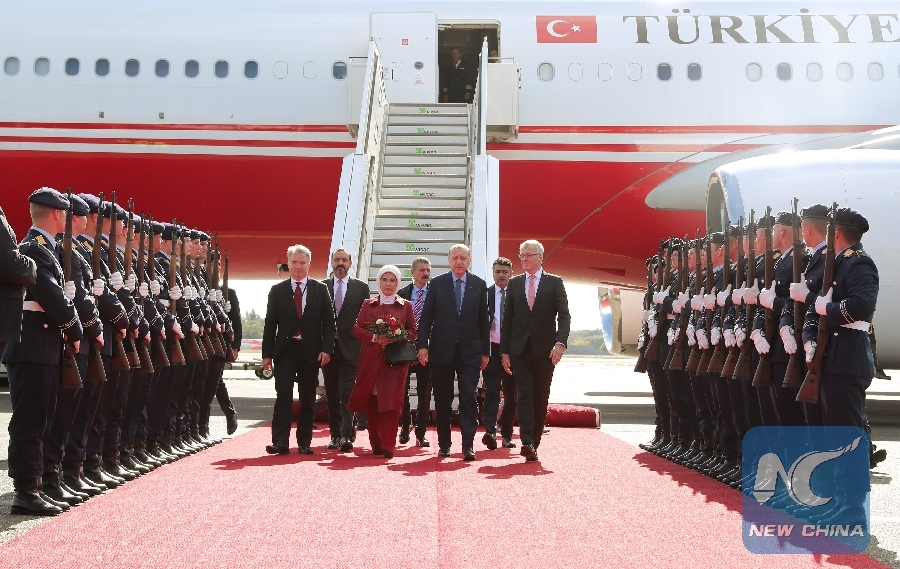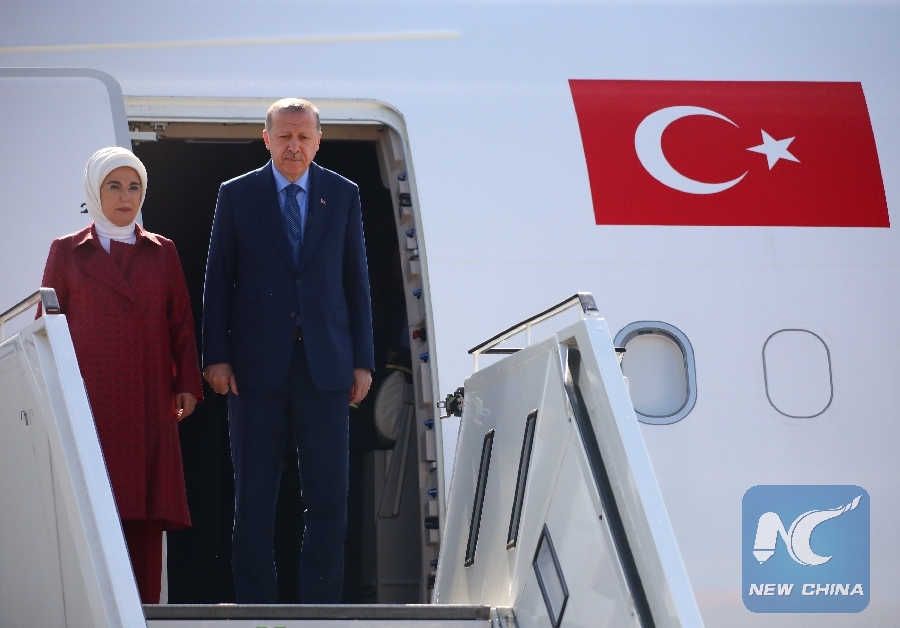
Turkish President Recep Tayyip Erdogan (2-R) and his wife Emine Erdogan (2-L) welcomed by the Chief of Protocol, Konrad Arz of Straussenburg (L), and Stephan Steinlein, Chief of the Office of the Federal President upon their arrival at the military part of Tegel Airport. (dpa photo)
ANKARA, Sept. 27 (Xinhua) -- Turkish President Recep Tayyip Erdogan paid a state visit to Germany on Thursday after four years in a bid to restore deeply eroded relations and boost economic cooperation as tensions in Ankara-Berlin ties appear to have been eased.
"The priority agenda on my visit to Germany will be completely leaving behind the period experienced in recent years in our political relations," Erdogan said.
Relations between Germany and Turkey hit rock bottom over the past two years, continued with ups and downs so far, but in recent months both sides have taken steps towards improving ties.
There have been signs of thaw in ties during the past months since German Foreign Minister Heiko Maas visited Turkey in early Sept. and Turkey released one German-Turkish journalist and allowed another German citizen to leave the country.

Turkish President Tayyip Erdogan, accompanied by his wife Emine Erdogan, arrives at Tegel airport in Berlin, Germany September 27, 2018. (Reuters photo)
A failed coup attempt in 2016 caused mutual mistrust and led to conflicts between Turkey and many of its Western allies, including Germany.
Nearly 4,000 supporters of Gulen movement, led by U.S.-based Islamic cleric Fethullah Gulen who is accused by the Turkish government of masterminding the coup, have gone to Germany from Turkey, local media reports.
Several of Gulen supporters, including former soldiers and diplomats, have been seeking asylum from Germany and the key suspects of the coup attempt are not extradited despite calls by Ankara.
In 2017, Turkish authorities arrested German citizens, further straining the relations, particularly Turkish-German journalist Deniz Yucel.
He was accused of being a German "spy" and carrying out propaganda of the outlawed Kurdistan Workers' Party (PKK). German government criticized his detainment as "political hostage-taking."
The journalist was released after spending 10 months in prison during a period of thaw between two countries.

Turkish President Tayyip Erdogan with his wife Emine arrive at the Tegel airport in Berlin, Germany, September 27, 2018. (Reuters photo)
German municipalities ban on Turkish politicians from campaigning for a 2017 referendum, which aimed to address Turkish expats, fuelling the crisis.
Tension further escalated after Turkish government's refusal of German parliamentarians to visit German troops at the Incirlik air base in southern Turkey, which led to redeployment of German troops to Jordan.
The Turkish President seeks to reconcile deteriorated ties between Turkey and European countries at a time when its economy is in slowdown with significant Turkish lira depreciation, mounting concerns about a build-up of debts.
The Turkish government is seeking new foreign investors to boost its economy. Erdogan will meet the CEOs of several major German companies during his visit to Berlin on Friday.
Turkish ruling Justice and Development Party (AKP) lawmaker Mustafa Yeneroglu, who has grown in Germany and holds Turkish-German citizenship, said that a delegation of German businessmen will pay a visit to Turkey in October.
The Turkish president's visit to Germany between Sept. 27-29 aims to "gain momentum to the Turkish-German ties again," Yeneroglu said, adding that he hopes the visit will end the tension and open a "new chapter" in bilateral relations.
Germany is Turkey's main economic and trade partner and home to more than 3 million people with Turkish roots. The bilateral trade volume reached 43.6 billion U.S. dollars in 2017. Nearly 7,500 German companies are active in Turkey.
President Erdogan will remind his German counterpart of taking measures against terrorist groups in Germany including Gulenists and the PKK, said Kemal Inat, deputy coordinator of Foundation for Political, Economic and Social Research (SETA), a local think tank.
For their part, Berlin want to normalize relations with Turkey because it is worried about further influx of Syrian refugees to Europe, Inat added.
Turkey has been hosting nearly 3.5 million refugees fled war-torn Syria.
"Another issue that compels the two countries to work more closely is the U.S. trade wars, which took a toll on global stability," said Yahya Bostan, columnist from Daily Sabah, adding that the potential impact of Washington's sanctions on Iran might also disturb on both economies.
On Aug. 26, German Minister for Economy Peter Altmaier voiced support for Turkey after the U.S. slammed sanctions against Ankara and raised trade tariffs on the country.
On Wednesday, one day ahead of his official visit, the Turkish leader called on Germany to press the reset button on their tricky relations.
"It is our responsibility to rationally move our relations forward on the basis of our shared interests, quite apart from irrational fears," Erdogan wrote in the op-ed published in the Frankfurter Allgemeine Zeitung newspaper.

